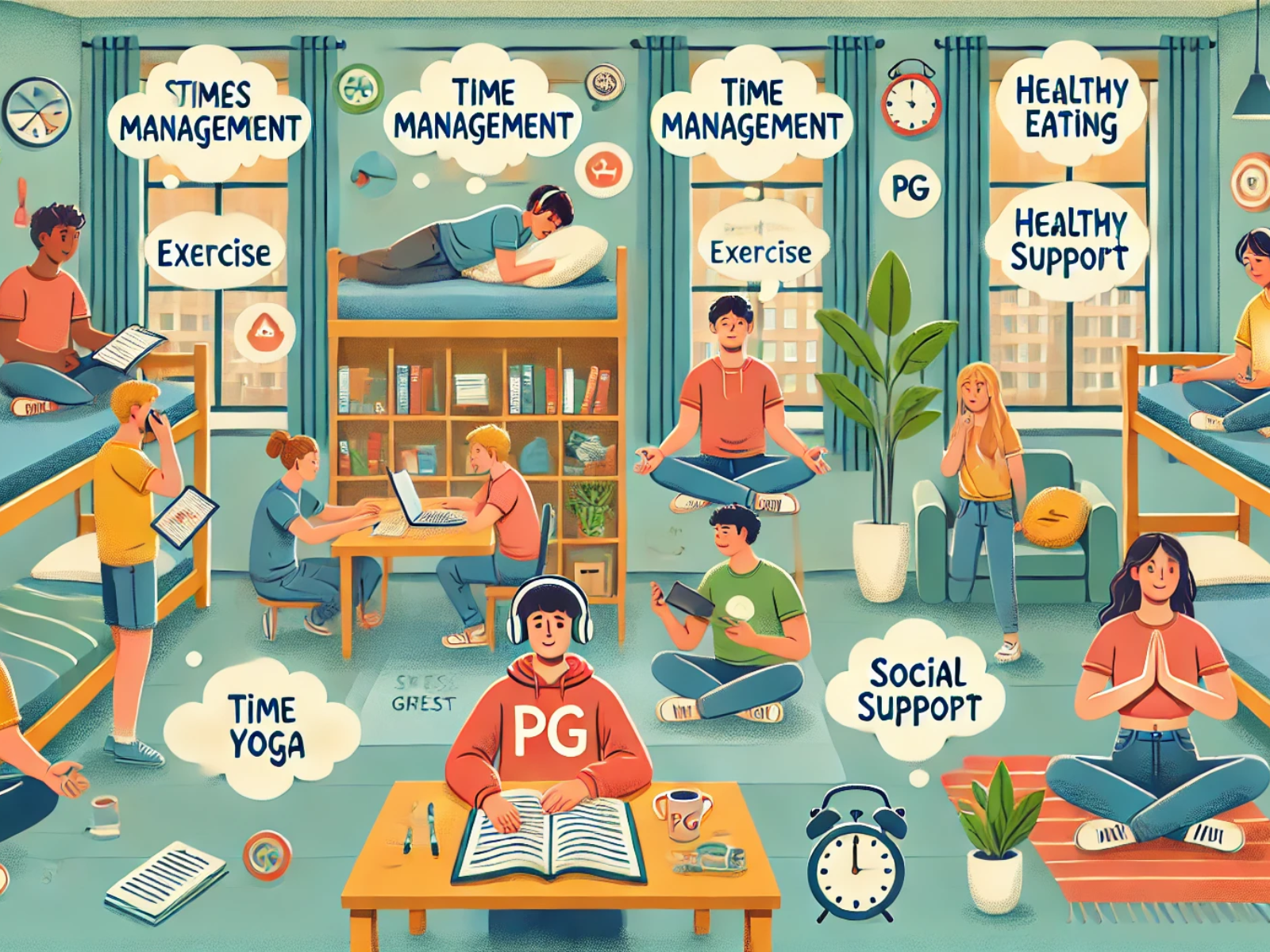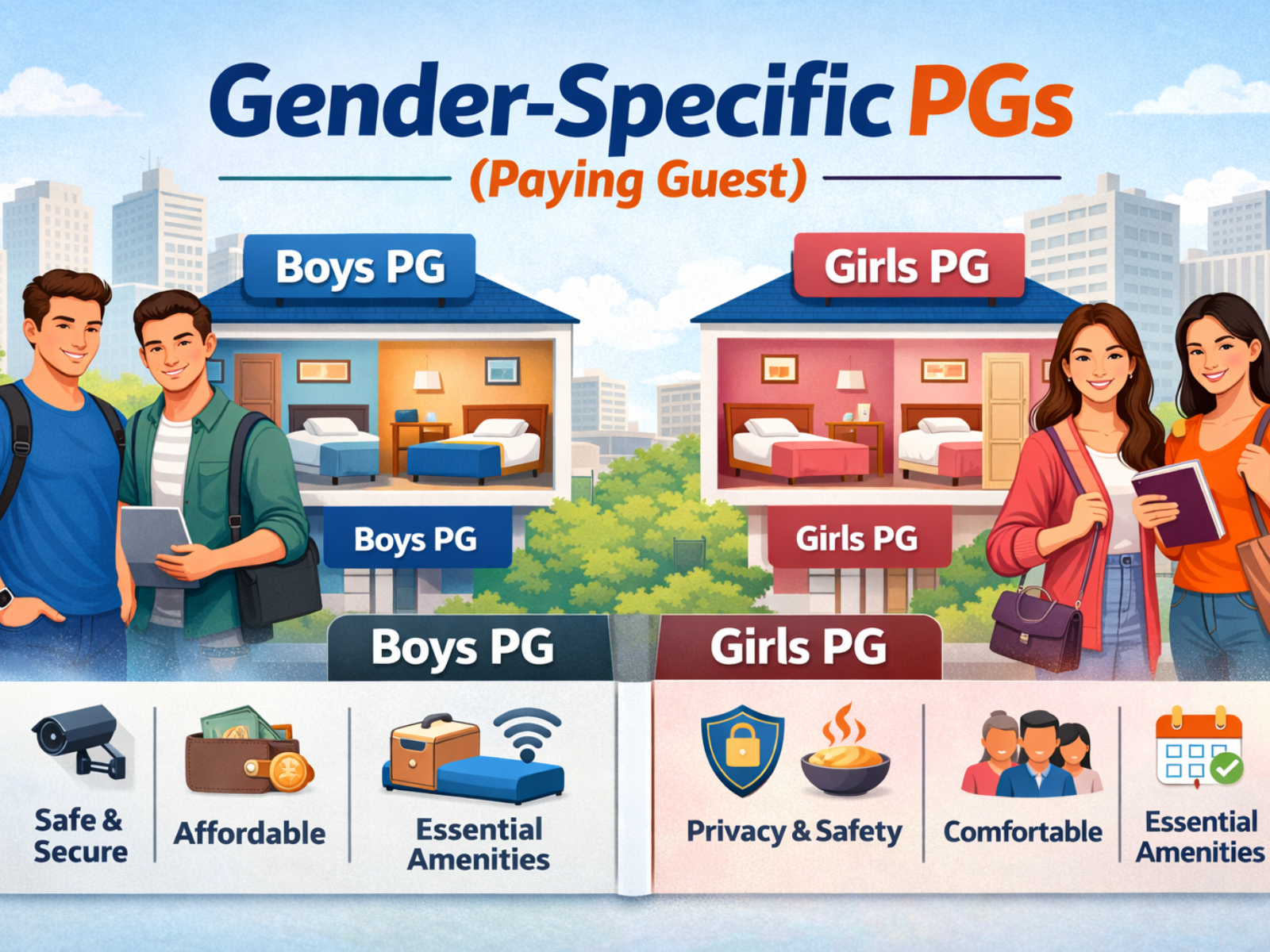
Living in a Paying Guest (PG) accommodation is a unique experience. Whether you’re a student navigating college life or a working professional adjusting to your first job, PG life introduces you to a world of independence—and stress.
From dealing with shared bathrooms to managing meals, juggling deadlines, and missing home, the pressure builds up silently. But here’s the truth: you can take charge of your stress. With a few practical strategies and some consistent habits, you can turn PG life into a fulfilling, growth-filled phase.
Let’s explore the best stress management techniques that work for real people, in real PG setups.
1. Build a Daily Routine to Stay Grounded
PG life can feel chaotic without structure. One day you’re up at 7 AM for a meeting or class; the next, you're binge-watching till 3 AM. This unpredictability can fuel stress, anxiety, and burnout.
Creating a routine doesn't mean planning every second. It simply means giving your day some rhythm—set times for waking up, meals, work or study, breaks, and sleep.
Benefits:
-
Reduces decision fatigue
-
Creates a sense of control
-
Increases productivity and confidence
Pro Tip: Use simple tools like Google Calendar or a paper planner. Start small: wake up at the same time every day and build from there.
2. Personalize Your Space—Even If It’s Small
In a PG, you may not have much space or privacy. But that doesn’t mean you can’t create comfort. Your bed, your desk, or even just a corner can become your “sanctuary” if you decorate it with personal touches.
Add things that bring you peace:
-
A soft blanket or cushion
-
Your favorite books or a vision board
-
A small plant or photo frame
-
String lights or a diffuser
Why It Works:
Having a calm, personal space reduces overstimulation and gives your mind a safe zone to unwind.
3. Master the Art of Breathing & Mindfulness
When things get overwhelming, your body reacts with faster breathing, a racing heart, or tension. You may not notice it—but your body holds the stress.
Practicing deep breathing, meditation, or mindfulness helps bring your nervous system back to balance.
Quick 3-Minute Routine:
-
Sit comfortably, close your eyes
-
Breathe in deeply through your nose for 4 seconds
-
Hold your breath for 4 seconds
-
Exhale slowly through your mouth for 6 seconds
-
Repeat for 3–5 minutes
Apps like Calm, Insight Timer, or Headspace are beginner-friendly and easy to use, even in a noisy PG.
4. Get Moving—Make Exercise Non-Negotiable
You don’t need a fancy gym or expensive equipment to stay fit. Just 20–30 minutes of movement daily can drastically improve your stress levels.
Options for PG Residents:
-
Morning walks or jogs nearby
-
YouTube home workouts (Yoga With Adriene, Chloe Ting, etc.)
-
Dance to your favorite playlist
-
Join a local yoga class or Zumba group
Benefits:
-
Releases endorphins (happy hormones)
-
Improves sleep and energy
-
Boosts self-confidence and motivation
Even stretching or walking around the block after dinner can do wonders.
5. Eat to Nourish, Not Just Fill
It’s tempting to survive on Maggi, chai, and samosas, especially during busy days. But poor nutrition affects your mood, focus, and energy.
In a PG, you may rely on tiffin services or cook for yourself. Either way, make conscious choices.
Smart Eating Habits:
-
Keep healthy snacks like fruits, dry fruits, yogurt, or roasted chana handy
-
Stay hydrated—aim for 6–8 glasses of water daily
-
Avoid too much caffeine, sugar, or oily food
-
Never skip breakfast—it sets your tone for the day
If you feel better physically, managing stress becomes easier mentally.
6. Talk to Someone—Don’t Bottle It Up
One of the most powerful ways to relieve stress is simply talking about it. PG life can feel lonely, especially when you're dealing with academic pressure, toxic work environments, or homesickness.
Talk to:
-
Your roommate or PG mate
-
A college friend or sibling
-
A counselor or mental health professional
Why It Helps:
Talking gives you perspective. Sometimes, just hearing someone say, “I feel the same way,” can reduce your anxiety by half.
Most colleges and some workplaces offer mental health support for free. Don’t hesitate to use it.
7. Cut Back on Digital Overload
Let’s face it—our phones never leave us alone. Endless notifications, doomscrolling, and social media comparisons silently drain us.
Try This:
-
Set app limits on Instagram or TikTok
-
Use “Do Not Disturb” mode during study or sleep
-
Have one screen-free hour each day
-
Use blue light filters in the evening
A quiet mind is a less anxious mind. And your mental space matters more than any screen.
8. Keep Your PG Room Clean & Organized
It may sound simple, but a clean room helps reduce mental clutter. Messy spaces often trigger restlessness and lower motivation.
Create a system:
-
Make your bed each morning
-
Assign a space for clothes, books, and toiletries
-
Deep clean every weekend (yes, even under the bed!)
You don’t have to be perfect—just consistent.
9. Prioritize Hobbies & "Me-Time"
Don’t let your identity be limited to being a student or employee. You are more than your job or grades.
Take time for hobbies:
-
Play guitar
-
Read fiction
-
Learn cooking
-
Paint or draw
-
Journal your thoughts
Hobbies are like therapy—they heal you without asking anything in return.
10. Get Quality Sleep (Yes, It Matters!)
Sleep is the foundation of stress management. Yet, it’s often the first thing we compromise on.
In a PG, sleep disruptions are common—roommates watching reels, noise from the next room, or late-night calls. Still, do your best to protect your sleep.
Sleep Hygiene Tips:
-
Avoid screens 30 minutes before bed
-
Use earplugs or soothing music to block noise
-
Keep your bed clean and cozy
-
Stick to a regular sleep schedule, even on weekends
Sleep well, and your body and brain will work with you, not against you.
Final Thoughts: You’re Not Alone
PG life is full of lessons—some joyful, some tough. But you don’t have to navigate it alone or under pressure all the time. By incorporating even 2–3 of these techniques into your daily life, you’ll notice a big shift in your mental state.
Remember: Managing stress isn’t about avoiding problems. It’s about building the tools to face them with calm and clarity.








